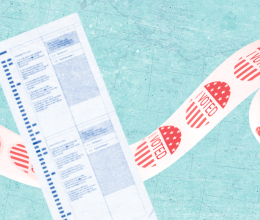FACTS:
On November 3, 2020, Edward Urbanek traveled to a precinct in Summit County in order to vote in the general election. Though he had voted in Summit County in other elections, he was uncertain whether that was the correct precinct for him for 2020, and asked the poll workers to confirm that it was. According to Mr. Urbanek, the poll workers attempted to identify the correct precinct for him, but were unable to do so; one of them instructed him to fill out a provisional ballot, which Mr. Urbanek was led to believe would not count as a vote. According to the Ohio Secretary of State’s Election Manual, the poll worker should have directed Mr. Urbanek to his home county for instructions. If he had insisted on submitting a provisional ballot, they should have attached a form that would invalidate it, and advised him that it would not count.
After filling out the provisional ballot, Mr. Urbanek traveled to a precinct in Ottawa County, where he explained the confusion. The Ottawa County poll worker confirmed that Mr. Urbanek was at the correct location, and provided him with a regular ballot, which Mr. Urbanek used to vote. According to Mr. Urbanek, he was told by poll workers, and thus believed, that he had only voted once.
After the election, the Ottawa County Board of Elections referred Mr. Urbanek’s case to the county prosecutor’s office, which charged him with felony illegal voting under Ohio Revised Code § 3599.12. At trial, the Ottawa County Court of Common Pleas construed that statute to create a strict liability offense for either attempted or actual illegal voting, meaning that Mr. Urbanek’s intent was regarded as irrelevant, and all of the poll workers’ instructions to him were excluded from evidence. He was convicted, and is now appealing to the Sixth District.
ISSUES:
Mr. Urbanek’s conviction is inconsistent with federal voting rights. Specifically, the federal Help America Vote Act (HAVA) requires that states allow a voter to complete a provisional ballot when their registration status or eligibility cannot be verified immediately. Under the Ottawa County court’s interpretation, any voter who completes a provisional ballot and is ultimately found ineligible is “attempting” to vote unlawfully. That interpretation would defeat the purpose of HAVA and provisional ballots.
STATUS:
Mr. Urbanek’s attorneys filed the Notice of Appeal on April 21 and received an extension to file the appeal brief. Appellant’s Brief was filed on July 20 and we filed our Amicus brief on July 21. On August 9, the State moved for an extension until September 9 to file Appellee’s brief. Appellant opposed. On August 18, the court granted the requested extension. On August 24, the Appellee filed a motion for 16 additional pages above the 30-page limit, and tendered its 46-page brief. Oral argument was held in Sandusky on October 25. The Sixth District issued its decision on June 20, 2023, affirming the judgment of the trial court. Mr. Urbanek filed a Notice of Appeal to the Ohio Supreme Court on August 14.
Jurisdictional memos were filed with the Supreme Court of Ohio on August 14 and September 12. On November 8, the court declined jurisdiction, which puts an end to the case.





